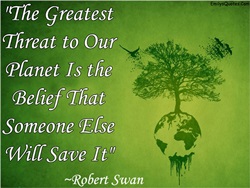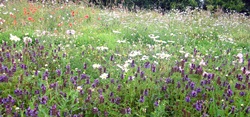![]()
As news of the recent Intergovernmental Panel on Climate Change (IPCC) report filters into our news stream and the realisation that time is running out for us to adapt to the massive changes in climate that will become our norm, my mind has turned to lawnmowers. Yes, those innocuous little machines that millions of us push or steer up and down our gardens on sunny days in a never-ending battle against nature.

The new IPCC report, where 1200 scenarios from scientific literature were analysed, show that global emissions of greenhouse gases have risen to unprecedented levels despite a growing number of policies to reduce climate change, with emissions growing more quickly between 2000 and 2010 than in each of the three previous decades.
We’ve known for years that our dependence on fossil fuels has to change and that we’re going to have to alter our lifestyles as global warming and climate extremes begin to affect us all, but have we been sticking our heads in the sand? How did emissions grow so quickly when we knew there were problems up ahead? Cutting emissions from electricity production to near zero is commonly featured in the report’s scenarios. But using energy efficiently is also important.
So how can we make a difference? Where, individually, do we begin?
It strikes me that we have to start with a change in mindset and shake away some habits and beliefs of old, before the planet decides it’s fed up waiting for us, and strips them away fast.
Many of us are caught in fossil fuel traps that we can’t see our way out of. Thanks to the economic downturn, we can’t afford to change our cars to more fuel-efficient models however much we’d like to; public transport doesn’t exist for rural dwellers and solar panels are a pipe dream when we’re struggling to pay our day-to-day bills. We’ve switched to energy-efficient light bulbs, turned down the heating and we’re saving water which is all well and good, we’re doing our bit, but what else can we do? Surely it’s up to our governments and policy makers to see us through and make the right decisions for us?
Maybe not entirely. It’s easy to throw our hands up and think that our reliance on fossil fuels is someone else’s problem, but it’s not. We have to take responsibility for our actions and choices, both in our business’ and our homes.
So with that in mind, my eyes have turned to our trusty lawnmower.
We’ve been thinking about the redundant area that is our lawn for a while but it was following my recent visit to the eco village of Cloughjordan, a lawn free environment, that our lawnmower’s days became numbered. It didn’t worry me that the naturalised grasses growing between the houses there were knee-high because, as a chemical free gardener, I was too busy thinking what a fantastic place it was for wildlife and beneficial insects to live in too. Being in a lawn free zone made me question our own lawn making habits.
In our garden that was fashioned from a farmer’s field, we sowed a tough grass seed lawn “for our children”, yet the reality is that kids enjoy hiding in long grass, making secret dens away from the adults. Now they’re older they have sports pitches in the village they’re throwing, kicking or hitting balls around in every week, they’re hardly ever in our garden sitting on the lawn!

As I was trundling my petrol driven lawnmower up and down once again, having locked it in the shed for the past six months, I was thinking about the fuel it was using and the time and effort it takes to cut the grass every week, and I wondered why we do it? How or why did this lawn mowing fashion begin? Was it some unconscious desire to prove we can tame nature or was it just because a perfectly clipped lawn ‘looks good’?
I grew up in a house with a lawn, all my neighbours had lawns, when I was renting I dreamt about a house with a lawn so it was by default that when we bought a house we’d sow one. A lawn looks pretty when it’s just been mowed, it’s the socially acceptable thing to do and that makes us feel good but on reflection, gazing at a field full of wildflowers can provoke a much deeper emotional response from many of us than admiring a stripey green lawn.

As a result of our realisation that mowing a lawn is a complete waste of time and energy, Mr G and I are now deliberating over the alternatives, which include:

1. Buy a couple of lambs to graze it, with a view to them finding their way into the (A rated) deep freeze.
2. Extend the veg garden and grow a lot more vegetables.
3. Buy a couple of piglets and let them turn the grass over so that in the long-term we can..
4. Plant a wildflower garden.
We haven’t decided yet. I think we may have to dig out the self-sufficiency books, put pen to paper with a few ideas. But whatever happens, the lawnmower will not be used as much as it once was. For the moment it’ll be pulled out of the shed to mow the paths between the vegetable beds, with the clippings used as a mulch, until we widen the beds and make them even more productive.

What’s important right now is that we make changes to our behaviour, however small and seemingly inconsequential. We have to consider the impact we’re having on the environment, the landscape around us and how much we’re contributing to global warming and climate change.
What do you think? Could you ditch the lawnmower or have you already done so and have never looked back?

Dee Sewell – a horticulturalist and certified trainer who started Greenside Up in 2009 and teaches people how to grow vegetables. Dee specialises in working with community gardens but also offers workshops, allotment visits, consultations, horticultural therapy, afterschools clubs as well as local talks – she tailors her services to meet clients needs. In 2012 Dee launched a Seed Gift Collection containing varieties of vegetable and insect friendly flowers with the aim of getting more people growing. Dee’s blog was a finalist in the 2012 Ireland Blog Awards in the Eco/Green and Lifestyle Categories.
Source: GreensideUp – FACT: Global Warming is Accelerating Fast ~ What Can We Do? – Dee Sewell




